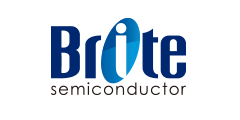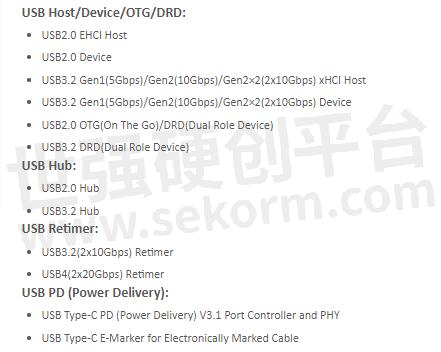Brite Semiconductor Provides USB IP Total Solution

Shanghai, China—Sep.9, 2022—Brite Semiconductor (“Brite”), a leading custom ASIC&IP provider, today announced providing USB IP total solution for ASIC/SoC. This solution consists of a series of USB controllers and PHY. It will help the System Manufacturer, PC OEM, Fabless, etc. to design high-quality ASIC/SoC products.
USB (Universal Serial Bus) has been extremely successful to connect hardware such as printers, scanners, keyboards, mice, flash drives, joysticks, cameras, monitors, and more to computers of all kinds, including smartphones, desktops, tablets, laptops, etc. USB4 spec is launched in September 2019 by USB Implementers Forum (USB-IF), it can tunnel USB3, Displayport, and PCIe protocol and be compatible with ThunderBoltTM 3. Type-C is the only connector type for USB4 and it can delivery a max of 100W power, and a max 40Gbps (2x20Gbps) data rate. Several days ago, USB-IF announced USB4 v2.0, which double the data rate to 80Gbps.
USB Hub is widely used to connect multiple devices to a single host. You plug it into your computer, then use the additional ports for mice, keyboards, and other USB devices all from a single port. Meanwhile, a USB hub can be used to move data between devices. With USB PD capability, USB Hub can charge multiple devices simultaneously. It is estimated that the market size of USB hubs will increase to 977 million dollars in the year 2027.
USB Redriver is used for USB3.x (10Gbps) to improve signal integrity and optimize signal routing. But when it comes to USB4 20 Gbps, the signal is much more fragile than its predecessors (USB3.x 10Gbps), making it more vulnerable to ISI, passband ripple, jitter sources, analog mismatches, termination mismatches, intra-pair skew, reflections, thermal noise, and power supply noise. As a result, the era of redrivers for USB is coming to a close. USB retimer support is being anticipated and has been written into USB4 specifications to provide a new generation of signal conditioning solutions.
In May 2021, USB PD3.1 spec was released by USB-IF, it can support max 48V and 240W power delivery. USB PD3.1 adopt Biphase Mark Coding (BMC) and 4b/5b symbol encoding/decoding for the physical layer and use a very complicated protocol layer and policy manager to provide accurate voltage and current control for the safety of charge. This spec would bring additional design opportunities for current and new users of USB Type-C technology.
Brite Semiconductor USB IP total solution includes:

"Brite Semiconductor is a member of USB-IF, and Brite’s USB2.0 OTG PHY was certified by USB-IF in 2013,” said Yadong Liu, VP of Engineering at Brite Semiconductor. “As always, Brite Semiconductor is committed to improving chip quality and reliability while pursuing higher performance, and lower risk and strives to provide customers with higher-quality technologies. Brite's rich USB IP solution can better meet the customer needs.”
- +1 Like
- Add to Favorites
Recommend
- USB2.0 (480Mbps) Double-pole Double-throw(DPDT) Analog Switch features a Low On Capacitance 3.7pf Typical
- DA Technology ESD protection array TPA143L05 applied to USB2.0 port protection
- MDT Magnetometers USB25103, USB27053 with Open USB Communication Protocol Facilitate Rapid Prototyping and Customization for Magnetic Sensor Research and Development
- Keysight Introduces Chiplet PHY Designer for Simulating D2D to D2D PHY IP Supporting the UCIe™ Standard
- Keysight Obtains FiRa Validation for an Automated Ultra-Wideband PHY Conformance Test Tool
- Brite Semiconductor Introduces Zero-Latency and True-Adaptive technologies for High-speed DDR PHY
- Brite Semiconductor Releases Gen2 DDR LP PHY IP Based on 40LL Process, Supporting RD DQS Falling Edge Training Mode
- Brite Launches High-Precision 16-bit 1MHz SAR ADC with Power Dissipation of 4.25mA and Achieving 14-bit ENOB
This document is provided by Sekorm Platform for VIP exclusive service. The copyright is owned by Sekorm. Without authorization, any medias, websites or individual are not allowed to reprint. When authorizing the reprint, the link of www.sekorm.com must be indicated.






























































































































































































































































































































































































































































































































































































































































































































































































































































































